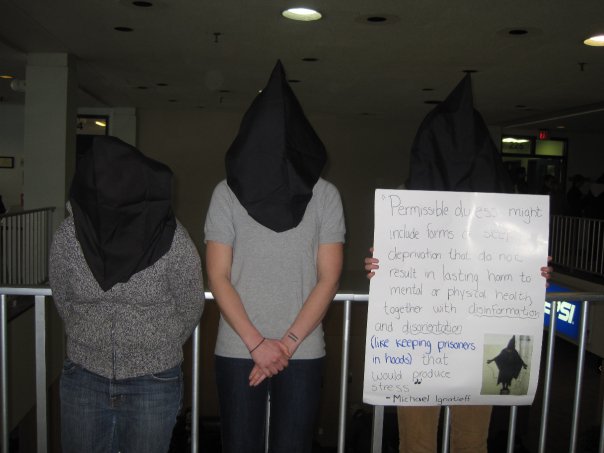greeted by protests



Thank you to my tipster in Halifax.
ASIDE: Will this small protest garner the same amount of press attention?
greeted by protests



Thank you to my tipster in Halifax.
ASIDE: Will this small protest garner the same amount of press attention?
Good times are here again! The Liberals have released an attack YouTube (not an ad, just earned media bait — full irony understood here). The video implies Canada is acting like a third world country:
“Cover-up: a description far more familiar to other countries, until now.”
Cover-ups. Where have we heard this before?
[It] shocked the Canadian public and brought to light internal problems in the Canadian [Forces]. Military leadership came into sharp rebuke after a CBC reporter received altered documents, leading to allegations of a cover up. Eventually a public inquiry was called. [It was] controversially cut short by the government…
Is this today’s story of alleged (yes alleged) torture in of Afghans in Afghanistan by Afghans? No. This was about Somalia. This was about Canadians. This was about a cover-up by a Liberal government.
Today, Afghan detainees, one allegedly beaten with a shoe by an Afghan prison guard, is (allegedly!) throwing the country into madness. This is not Canada’s Abu Ghraib as some Liberal strategists have regrettably suggested.
Get the scandal playbook! Look up Chapter 3: What did you know and when did you know it?
The Liberal ad continues:
“When questions arose about what he and his government knew about torture in Afghanistan, Stephen Harper shut down Parliament.”
Flashback to Michael Ignatieff in a New York Times magazine op-ed piece, May 2, 2004:
“To defeat evil, we may have to traffic in evils: indefinite detention of suspects, coercive interrogations, targeted assassinations, even pre-emptive war.”
And for full context, we know that Michael Ignatieff has since climbed down on the Iraq war, and called it a mistake. And torture? Well, that was intellectual pretzel making, his defenders will say. He has, afterall, grappled with the issue and has come around to the fact that torture is wrong. We think.
Kady O’Malley, then at Macleans got the federal party leaders’ current positions on torture before this latest resurgence of this old story,
Michael Ignatieff:
“His current view is the same view he held as a renowned human rights expert who helped author the Responsibility to Protect: he is opposed.”
Case closed? Seems good enough for some reporters.
And Stephen Harper?
“The Prime Minister unequivocally condemns torture in all its forms. Canada is a signatory to both the Geneva Conventions and the UN Convention against Torture and Other Cruel, Inhuman or Degrading Treatment or Punishment.”
Good enough for others?
And the prorogation of Parliament? Was this to “cover-up torture” in Afghanistan? The Liberal line is a classic political attack from days gone by: “we don’t know, he just won’t say”.
Much has been said of prorogations and their history. Shutting down Parliament at the apparent whim of a Prime Minister should perhaps open up a broader debate about the use of this power, and those that prorogue may incur the political cost that goes along with it whether large or small. But while we’re on the topic of Parliament and the apparent upset that prorogation has caused some Canadians, surely the dissolution of Parliament at a Prime Minister’s whim should be much worse shouldn’t it?
Flashback to 2000, Jean Chretien in a comfortable majority not only padlocked parliament, shut it down, cast aside committees and put up a chain link fence, but he also fired all MPs from their job and made them reapply, just because Stockwell Day was weak and ready to be slaughtered (he was).
And to 2008 when Stephen Harper, despite his own fixed election date law, called an election citing the log jammed committees in Parliament. Granted, the law allowed for an early election to be called if Parliament could not proceed smoothly, but despite this subjective test for maneuvering within the law and straight into an election, opponents called it crass opportunism because Stephen Harper perceived Stephane Dion to be weak and ready to be slaughetered (he was).
So, does prorogation cause anger and if so, does it amount to a high political price to be paid by whomever invokes it? And yet, dissolution is in effect, Prorogation Plus. Prime Ministers have been accused of political opportunism in the past and will be accused of political opportunism in the future. And if opportunism is the currency of politics, who knew that in Canadian politics we’d see… politics?
The question remains. Is this an unusual time in Canadian politics? Does prorogation cause more upset than dissolution? Are we in a place where down is up and black is white in Canadian politics? If so, does Michael Ignatieff perceive the Prime Minister to be weak and ready to be slaughtered in an election?
I have my doubts.
And Michael Ignatieff? He has his own.
In Ottawa, depending on their content requirements, Hill reporters are loving or loathing the prorogation so far. For activists, a second prorogation in little over one year has those on left seething in anger over what they perceive to be an “affront to democracy”.
To be sure, this isn’t to be dismissed lightly; despite your political inclination, there is a tangible perception that Stephen Harper is firmly in control of Parliament and its functions, for better or worse. While our Parliamentary system and it’s advantages and shortcomings may be formally debated at another time, some online activists have taken to Facebook to informally vent their frustrations. The CBC’s Terry Milewski reports on the Facebook group with over 25,000 people:
Too bad Terry wasn’t the The National’s senior national affairs correspondent last year when the anti-coalition Facebook group soared to over 125,000 in a week. To be fair, this week has been slow while last year’s coalition story was the busiest week we’ve had in Ottawa in years and there were many other non-Facebook stories to report!
Anger over prorogation is a parliamentary issue, so one wonders, where is the parliamentary political leadership? A healthy democratic grassroots movement is forming online and the would be leaders are… on vacation!
As Milewski remarked, and as CTV’s Roger Smith confirms below, Michael Ignatieff is on vacation in Europe while Jack Layton is snorkling in Belize. Opponents to prorogation have remarked with some hyperbole that “MPs just gave themselves a three month vacation”. While the Conservative line is that MPs are indeed working in their ridings consulting with constituents on the next phase of the economic recovery, it is Stephen Harper’s opposition that is on vacation. Grassroots Canadians on the left are upset that their Parliamentarians aren’t “working” in Ottawa, while their partisan leadership jets off for a little R&R.
Smith reports that the Prime Minister has been in Ottawa working.
This isn’t the first time that Michael Ignatieff has been criticized for being out of touch with the grassroots of his party and of course, this will just feed into the Conservative narrative that the Liberal leader is aloof and on “academic time”.
This month, The Walrus has an interesting description of Ignatieff’s working style,
“Indeed, there were rumours that he needed a nap in the afternoon or turned into a snarling wolf by nightfall.”
and from the Toronto Star, his adamant defense of “Iggy time”,
Also, Iggy’s staff misled Canadian media about his 2006 vacation – they told the media that his mother-in-law was ill, when in fact he was off on a European holiday. “There is no health crisis. There never was… I’m entitled to a holiday.”
Last year, the Ottawa Citizen reported that Ignatieff’s family has a villa in the south of France where “property of similar size in the area sells for upwards of $1.8 million”. It is unknown if he has made time to visit the estate while on vacation.
Meanwhile in Canada, are we seeing the budding of a significant political movement? If so, where is the political leadership?
UPDATE: Did Michael Ignatieff forget to tell his staff that he went on vacation?